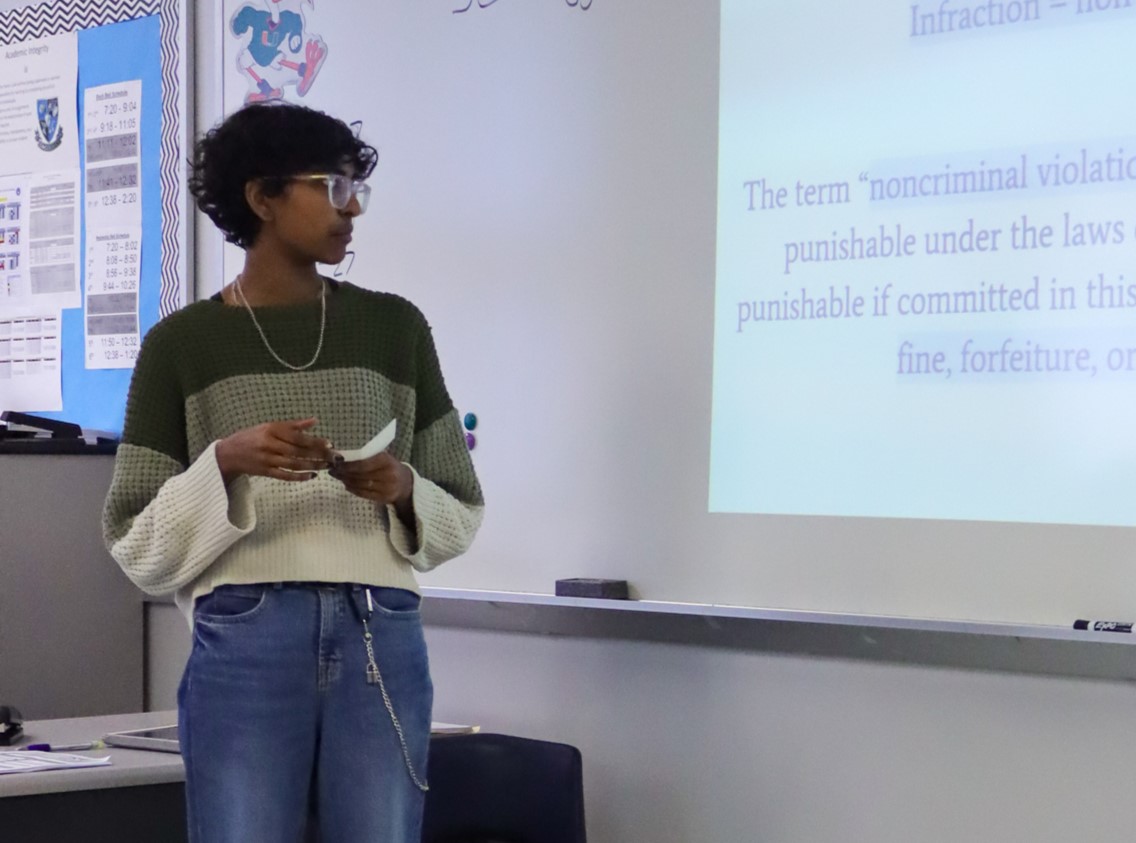With a contentious, close election, the BluePrint staff polled students on their choices in the most important and most controversial races on the Florida Ballot. Students from all grades were asked to choose a winner in races for the president and senate, plus vote on three amendments: school board partisanship, legalizing marijuana and protecting abortion rights. Student choices closely mirrored state choices on almost every issue.
President
 At the national level, former president Donald Trump won the election, receiving 295 electoral college votes, swiftly crossing the 270 threshold. 30 votes were from Florida, where he also won the popular vote with 56.1%. Nationally, he received 50.2% of the votes. Eyes were on swing states leading up to and throughout election night, as states like Pennsylvania, Wisconsin, Georgia and Michigan, when polled before the race, had neck-in-neck numbers leading up to election day. Trump swept the category of voters aged 18-29, as well as Latino voters, both of which proved to be key in this race. Trump also secured electoral and popular votes from all swing states. School polling mirrored these results, as 58.6% of students thought President Trump would be the best fit for the nation’s next president.
At the national level, former president Donald Trump won the election, receiving 295 electoral college votes, swiftly crossing the 270 threshold. 30 votes were from Florida, where he also won the popular vote with 56.1%. Nationally, he received 50.2% of the votes. Eyes were on swing states leading up to and throughout election night, as states like Pennsylvania, Wisconsin, Georgia and Michigan, when polled before the race, had neck-in-neck numbers leading up to election day. Trump swept the category of voters aged 18-29, as well as Latino voters, both of which proved to be key in this race. Trump also secured electoral and popular votes from all swing states. School polling mirrored these results, as 58.6% of students thought President Trump would be the best fit for the nation’s next president.
“This was my first time voting, so I was really disappointed in the outcome, especially because I was convinced that America could start moving in the right direction,” senior Zuri Bailey said. “I was wrong, and it saddens me to know that people voted for this president because they actually supported his plans and ideals.”
Amendment 1
 Amendment 1 stated that school board elections, which are currently required to remain nonpartisan under state law, would become partisan. 54% of Florida citizens voted in favor of this amendment; however Florida requires a supermajority of 60% to pass amendments. Had this passed, school board members would have to choose a party affiliation to run on the ballot. This kept in place the state constitutional requirement that candidates running for the school board must remain nonpartisan and cannot be affiliated with a political party when running for office. School polling was even stronger against the amendment, with 54% of those polled indicating that they would have voted no.
Amendment 1 stated that school board elections, which are currently required to remain nonpartisan under state law, would become partisan. 54% of Florida citizens voted in favor of this amendment; however Florida requires a supermajority of 60% to pass amendments. Had this passed, school board members would have to choose a party affiliation to run on the ballot. This kept in place the state constitutional requirement that candidates running for the school board must remain nonpartisan and cannot be affiliated with a political party when running for office. School polling was even stronger against the amendment, with 54% of those polled indicating that they would have voted no.
Amendment 3
 This amendment would have legalized the recreational use of marijuana for adults 21 and older. 56% of voters wanted the legalization; however, this needed to cross the 60% supermajority threshold to pass. Falling 4% short, this resulted in a “no.” Legalizing recreational marijuana for adults 21 and older was on the ballot in three other states as well. North Dakota, South Dakota, and Nebraska all needed a simple majority of 50% to pass the amendment. Nebraska was the only state out of the four to pass it, with 71% of people voting for legalization. Unlike in South Dakota, where marijuana appeared on the ballot for the third time, this was the first time in Florida where legalizing recreational marijuana was put to public vote. School polling was similar to official voting, with 53.6% of students agreeing that marijuana should be legalized for recreational use for adults 21 and up.
This amendment would have legalized the recreational use of marijuana for adults 21 and older. 56% of voters wanted the legalization; however, this needed to cross the 60% supermajority threshold to pass. Falling 4% short, this resulted in a “no.” Legalizing recreational marijuana for adults 21 and older was on the ballot in three other states as well. North Dakota, South Dakota, and Nebraska all needed a simple majority of 50% to pass the amendment. Nebraska was the only state out of the four to pass it, with 71% of people voting for legalization. Unlike in South Dakota, where marijuana appeared on the ballot for the third time, this was the first time in Florida where legalizing recreational marijuana was put to public vote. School polling was similar to official voting, with 53.6% of students agreeing that marijuana should be legalized for recreational use for adults 21 and up.
“If [legalizing marijuana] can help society or help people with medical or mental health issues, why not?” senior Eldon Ampomah said. “I don’t think there’s any negative side to legalizing it, which is why I personally voted for it to be legalized.”
Amendment 4
Protecting the right to an aborition was on the ballot in 10 states, including Florida, and was passed in seven. While most states needed a simple majority of 50% of voters to agree that abortion is a constitutional right, Florida needed a 60% supermajority and fell short at just 57%. School polling resulted in 64.9% of students agreeing that abortion should be legalized past the six-week mark. In 2022, Roe v. Wade, the Supreme Court decision providing a legal framework to abortion rights in the United States, was overturned. This decision had been in place since 1973.
 The Dobbs Decision effectively left this choice for the states to decide, which several states, including Florida, used to limit the right to abortion. On April 1, 2024, the Florida Supreme Court ruled that the Constitution’s right to privacy does not include the right to abortion. The ruling allowed the state’s 15-week abortion ban, passed by the legislature in 2022, to take effect. In 2023, the legislature passed another bill, known as the Heartbeat Protection Act, to ban abortion at six weeks, which was contingent on the state supreme court overturning its prior ruling and allowing the 15-week ban to take effect. The six-week ban took effect on May 1. Before 2022, abortions were legal in Florida until 24 weeks.
The Dobbs Decision effectively left this choice for the states to decide, which several states, including Florida, used to limit the right to abortion. On April 1, 2024, the Florida Supreme Court ruled that the Constitution’s right to privacy does not include the right to abortion. The ruling allowed the state’s 15-week abortion ban, passed by the legislature in 2022, to take effect. In 2023, the legislature passed another bill, known as the Heartbeat Protection Act, to ban abortion at six weeks, which was contingent on the state supreme court overturning its prior ruling and allowing the 15-week ban to take effect. The six-week ban took effect on May 1. Before 2022, abortions were legal in Florida until 24 weeks.
“I’m devastated that this amendment failed. As a girl going into her college years, which are typically known for being exposed to new experiences, I am extremely scared,” senior Madalena Agosto said. “I wish that women had more of a say in the matter, and I think that this will cause a lot of devastation and many of us will be affected negatively.”
Senate
 Incumbent Rick Scott defeated democrat Debbie Mucarsel-Powell and was re-elected during the senate race, with 55.6% of the votes for Scott. School polling was similar, as 53.7% voted that Scott should be reelected. Scott served two terms as governor from 2011-2019, growing a solid voter base before running for senate. The Mucarsel-Powell and Scott race had its fair share of mess, with intense ads from both sides portraying the wrongdoings of the other. Scott is currently trying to challenge Senate Leader Mitch McConnell and pledged himself as an ally to President Trump.
Incumbent Rick Scott defeated democrat Debbie Mucarsel-Powell and was re-elected during the senate race, with 55.6% of the votes for Scott. School polling was similar, as 53.7% voted that Scott should be reelected. Scott served two terms as governor from 2011-2019, growing a solid voter base before running for senate. The Mucarsel-Powell and Scott race had its fair share of mess, with intense ads from both sides portraying the wrongdoings of the other. Scott is currently trying to challenge Senate Leader Mitch McConnell and pledged himself as an ally to President Trump.







